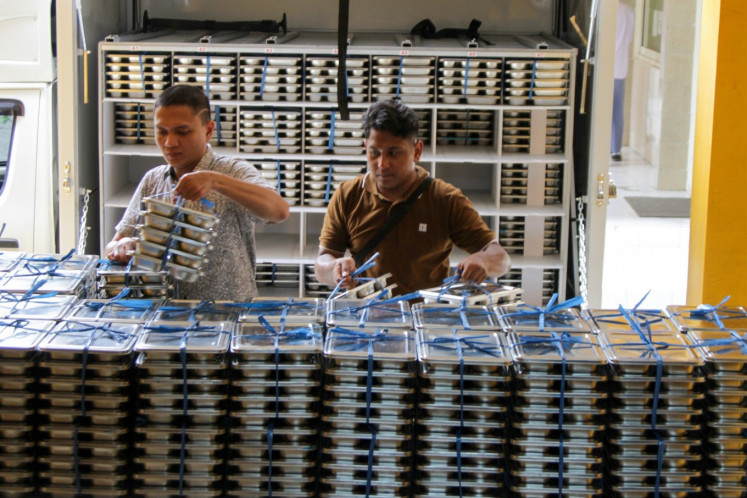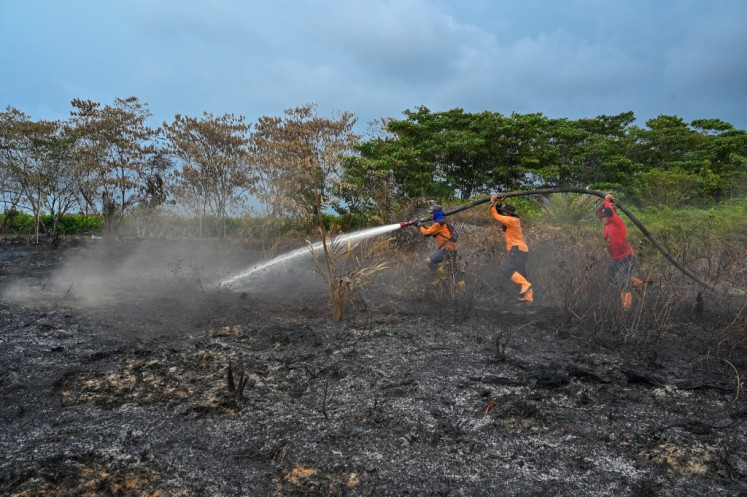Net-zero transition is not enough, we need a just transition for RI
Indonesia is the world's eighth-biggest greenhouse gas (GHG) emitter, with GHG growing in parallel with economic growth. However, in terms of per-capita emission, Indonesia ranked low at 113th on the list.
Change text size
Gift Premium Articles
to Anyone

T
he world is facing a growing climate crisis, and the latest report by the World Meteorological Association (WMA) paints an alarming picture. Four key climate change indicators – greenhouse gas concentrations, sea-level rise, ocean heat and ocean acidification – set new records in 2021. The report also confirmed that the past seven years had been the warmest seven years, with average global temperatures 1.1 degrees Celsius above pre-industrial levels.
Indonesia is the world's eighth-biggest greenhouse gas (GHG) emitter, with GHG growing in parallel with economic growth. However, in terms of per-capita emission, Indonesia ranked low at 113th on the list. This paradox is indicative of why thinking through the net-zero transition for Indonesia requires a different paradigm that delivers on the needs of the environment, the economy and the rakyat (people).
Achieving a fair future for all
The need to decarbonize Indonesia's economy is evident, and Indonesia has made a strong commitment to transition by 2060. But transitioning away from carbon-emitting industries presents many challenges.
The energy sector offers an example of this conundrum. Fossil-fuel-based technologies dominate Indonesia's energy landscape, with coal, oil, and gas accounting for more than 90 percent of total primary energy use. Coal-fired power plants accounted for 59 percent of the energy mix and a third of Indonesia's emissions in 2019. Electricity demand will continue to grow as the nation's economy expands and the country drives toward 100 percent electrification.
At the micro-level, the heavy reliance on coal as a fuel for power plants and revenue-generating exports poses challenges to employment and local economies. The mining sector contributes up to 60 percent of gross regional domestic product (GRDP) in some districts, and the mining industry is often the primary employer in those areas.
This context means that for Indonesia to achieve or even accelerate its climate ambitions successfully, we need a strategic road map to provide equitable alternatives without widespread job losses and economic hardship.
The idea of a just transition is precisely that. The primary goals of such a transition are to achieve the climate target and increase the well-being of the average Indonesian. It should place Indonesia on a path to a fairer, more equitable and sustainable future, one which transitions workers and industries to build new, local industries with resilient and sustainable value chains.
How to energize Indonesia's just transition
Delivering a just transition will require careful strategic planning, including developing sector-specific road maps for priority sectors to help illuminate the best path forward.
Electricity, transport, manufacturing and agriculture, forestry and other land use (AFOLU) represents 70 percent of Indonesia's total emissions and a large part of the Indonesian economy. The private and public sectors should work to create a just transition road map for these sectors with two key elements — decarbonization/emissions abatement and the mitigation of any socioeconomic implications.
The government will need to support this journey, including significant financial, technological and capacity support to address hard-to-abate sectors effectively. Beyond that, it should also include support for the economic transition and diversification of industries through interventions such as incentives to assist the emergence of new industries and support to expand into other sectors to diversify economic activity.
Empowering a just transition will also require investment in critical areas such as job creation, education, re-skilling, social and ecological welfare, managing cultural and geographic dislocation, small and medium enterprise (SME) ownership and infrastructure planning to mitigate impacts while building resilience for the future.
Recognizing Indonesia's starting point relative to many more developed nations, global support for this just transition is also critical. The international community plays an important role through foreign investment as well as development finance and support. Indonesia should welcome these efforts with a holistic, sound and investable “just transition” road map to galvanize the investments.
Key decision-makers in Indonesia from both the public and private sectors must come together to assess these important opportunities and challenges, as well as the enablers required, and start the “just transition” path forward together that leaves no one behind.
--
Haikal Siregar is managing director and partner, head of BCG Indonesia, Boston Consulting Group. Verra Wijaya is lead knowledge analyst, team lead of BCG's public sector, Boston Consulting Group.









